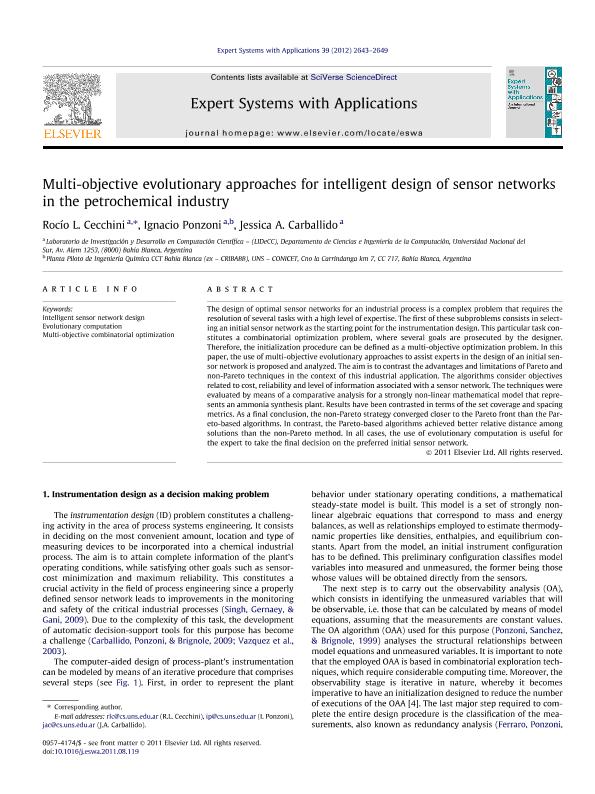Mostrar el registro sencillo del ítem
dc.contributor.author
Cecchini, Rocío Luján

dc.contributor.author
Ponzoni, Ignacio

dc.contributor.author
Carballido, Jessica Andrea

dc.date.available
2022-01-06T19:36:24Z
dc.date.issued
2012-02
dc.identifier.citation
Cecchini, Rocío Luján; Ponzoni, Ignacio; Carballido, Jessica Andrea; Multi-objective evolutionary approaches for intelligent design of sensor networks in the petrochemical industry; Pergamon-Elsevier Science Ltd; Expert Systems with Applications; 39; 3; 2-2012; 2643-2649
dc.identifier.issn
0957-4174
dc.identifier.uri
http://hdl.handle.net/11336/149739
dc.description.abstract
The design of optimal sensor networks for an industrial process is a complex problem that requires the resolution of several tasks with a high level of expertise. The first of these subproblems consists in selecting an initial sensor network as the starting point for the instrumentation design. This particular task constitutes a combinatorial optimization problem, where several goals are prosecuted by the designer. Therefore, the initialization procedure can be defined as a multi-objective optimization problem. In this paper, the use of multi-objective evolutionary approaches to assist experts in the design of an initial sensor network is proposed and analyzed. The aim is to contrast the advantages and limitations of Pareto and non-Pareto techniques in the context of this industrial application. The algorithms consider objectives related to cost, reliability and level of information associated with a sensor network. The techniques were evaluated by means of a comparative analysis for a strongly non-linear mathematical model that represents an ammonia synthesis plant. Results have been contrasted in terms of the set coverage and spacing metrics. As a final conclusion, the non-Pareto strategy converged closer to the Pareto front than the Pareto-based algorithms. In contrast, the Pareto-based algorithms achieved better relative distance among solutions than the non-Pareto method. In all cases, the use of evolutionary computation is useful for the expert to take the final decision on the preferred initial sensor network.
dc.format
application/pdf
dc.language.iso
eng
dc.publisher
Pergamon-Elsevier Science Ltd

dc.rights
info:eu-repo/semantics/openAccess
dc.rights.uri
https://creativecommons.org/licenses/by-nc-sa/2.5/ar/
dc.subject
EVOLUTIONARY COMPUTATION
dc.subject
INTELLIGENT SENSOR NETWORK DESIGN
dc.subject
MULTI-OBJECTIVE COMBINATORIAL OPTIMIZATION
dc.subject.classification
Ciencias de la Información y Bioinformática

dc.subject.classification
Ciencias de la Computación e Información

dc.subject.classification
CIENCIAS NATURALES Y EXACTAS

dc.title
Multi-objective evolutionary approaches for intelligent design of sensor networks in the petrochemical industry
dc.type
info:eu-repo/semantics/article
dc.type
info:ar-repo/semantics/artículo
dc.type
info:eu-repo/semantics/publishedVersion
dc.date.updated
2021-08-13T16:18:20Z
dc.journal.volume
39
dc.journal.number
3
dc.journal.pagination
2643-2649
dc.journal.pais
Estados Unidos

dc.journal.ciudad
Maryland
dc.description.fil
Fil: Cecchini, Rocío Luján. Consejo Nacional de Investigaciones Científicas y Técnicas. Centro Científico Tecnológico Conicet - Bahía Blanca; Argentina. Universidad Nacional del Sur. Departamento de Ciencias e Ingeniería de la Computación. Laboratorio de Investigación y Desarrollo en Computación Científica; Argentina
dc.description.fil
Fil: Ponzoni, Ignacio. Universidad Nacional del Sur. Departamento de Ciencias e Ingeniería de la Computación. Laboratorio de Investigación y Desarrollo en Computación Científica; Argentina. Consejo Nacional de Investigaciones Científicas y Técnicas. Centro Científico Tecnológico Conicet - Bahía Blanca. Planta Piloto de Ingeniería Química. Universidad Nacional del Sur. Planta Piloto de Ingeniería Química; Argentina
dc.description.fil
Fil: Carballido, Jessica Andrea. Consejo Nacional de Investigaciones Científicas y Técnicas. Centro Científico Tecnológico Conicet - Bahía Blanca; Argentina. Universidad Nacional del Sur. Departamento de Ciencias e Ingeniería de la Computación. Laboratorio de Investigación y Desarrollo en Computación Científica; Argentina
dc.journal.title
Expert Systems with Applications

dc.relation.alternativeid
info:eu-repo/semantics/altIdentifier/url/https://www.sciencedirect.com/science/article/abs/pii/S0957417411012504
dc.relation.alternativeid
info:eu-repo/semantics/altIdentifier/doi/http://dx.doi.org/10.1016/j.eswa.2011.08.119
Archivos asociados
